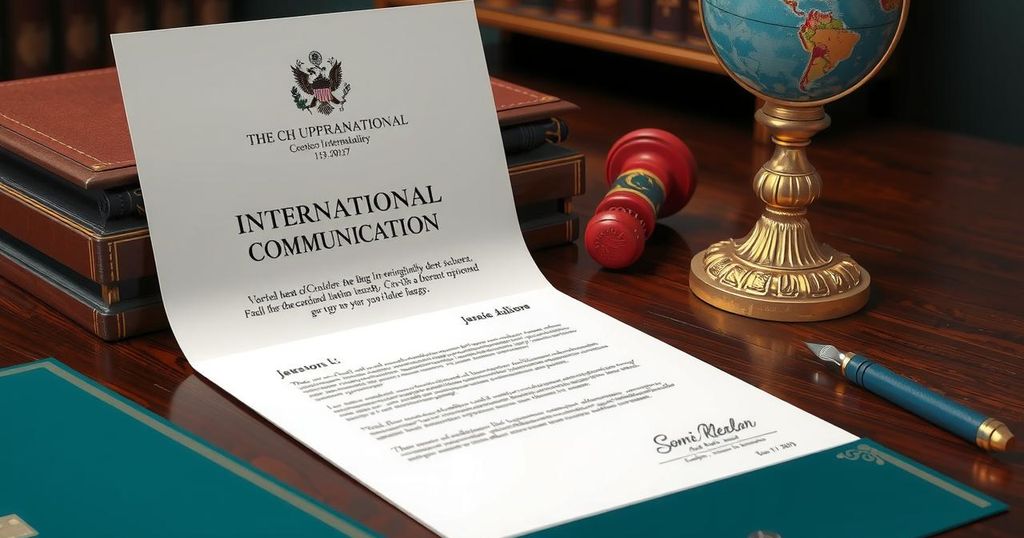President Trump has sent a letter to Iran’s Supreme Leader, proposing negotiations to limit Iran’s advancing nuclear program. He expressed a preference for peace over military action while cautioning that urgent discussions are necessary. The U.S. and Israel remain committed to preventing Iran from acquiring nuclear weapons amid rising tensions. However, the Iranian response and the overall effectiveness of this diplomatic outreach remain uncertain.
President Donald Trump has reached out to Iran’s Supreme Leader Ali Khamenei with a letter proposing negotiations aimed at restraining Iran’s accelerating nuclear program. This initiative seeks to establish a new agreement to replace the prior nuclear deal from which the United States withdrew during Trump’s first term. While Iranian state media chose to highlight Trump’s acknowledgment of this communication, there remains no formal confirmation from Khamenei’s office regarding any received letter.
In a subsequent Oval Office address, President Trump referenced Iran, stating that a significant development could unfold “very soon.” He expressed a preference for a peaceful resolution and emphasized that such an outcome would be preferable to military confrontation. Trump suggested that imminent discussions could yield positive results for Iran, while also indicating the potential for military intervention if negotiations do not commence.
This diplomatic overture emerges amidst heightened tensions, primarily due to both Israel and the United States’ commitment to preventing Iran from acquiring nuclear capabilities. Iran has reportedly increased its uranium enrichment activities to levels approaching weapons-grade, raising concerns of a possible military conflict. During his interview, Trump made it clear that he communicated with Iran to encourage negotiations, warning against the consequences of military actions should diplomacy fail.
Despite the White House’s confirmation that the letter is intended to initiate nuclear discussions, specifics of what was proposed remain undisclosed. Trump’s approach recalls his earlier interactions with North Korean leader Kim Jong Un, which, despite initial dialogue, did not culminate in substantial agreements to curb nuclear armament.
Iran has maintained that its nuclear endeavors are intended solely for peaceful purposes, notwithstanding increasing threats from officials to pursue nuclear arms amid escalated U.S.-Iran tensions. U.S. intelligence posits that while Iran has not initiated a formal weapons program, it has engaged in activities positioning it for potential nuclear weapon production.
Over the years, the relationship between Trump’s administration and Tehran has deteriorated following the 2018 withdrawal from the nuclear deal. This withdrawal led to sanctions crippling Iran’s economy, and retaliatory actions including notable attacks and military operations undertaken by the U.S.
Under the previous nuclear agreement, Iran’s uranium enrichment was capped at 3.67% purity. However, reports indicate that Iran’s current stockpile of enriched uranium has surged significantly, rapidly intensifying pressure on Trump, who continues to advocate for negotiations while employing strict sanctions.
Despite Khamenei’s earlier indications of openness to dialogue, he has recently declared discussions with the U.S. as unwise and undignified. The outcome of this latest diplomatic effort remains uncertain, with prior attempts to communicate having been rebuffed in 2019. Economic pressures within Iran due to sanctions contribute further to the complexity of these negotiations amidst ongoing domestic unrest and international geopolitical strains.
The situation continues to evolve, with Israel and Iran engaging in direct confrontations amid the Israel-Hamas conflict. Insights into how Iran will react to increased diplomatic pressure remain murky, particularly given the ongoing impact of sanctions and internal societal issues. As of late Friday, reports confirmed that Iran’s U.N. mission had not received any correspondence from Trump.
In summary, President Trump’s letter to Iran’s Supreme Leader seeks to initiate discussions regarding Iran’s nuclear program as a means to avert military confrontation. This outreach illustrates an attempt to establish negotiations while recognizing the dire stakes of nuclear escalation. However, the effectiveness of this communication remains speculative in light of Iran’s previous rejections and ongoing economic pressures. The geopolitical landscape involving Israel, the United States, and Iran continues to present challenges regarding the stability of nuclear negotiations and potential conflict.
Original Source: www.kob.com




